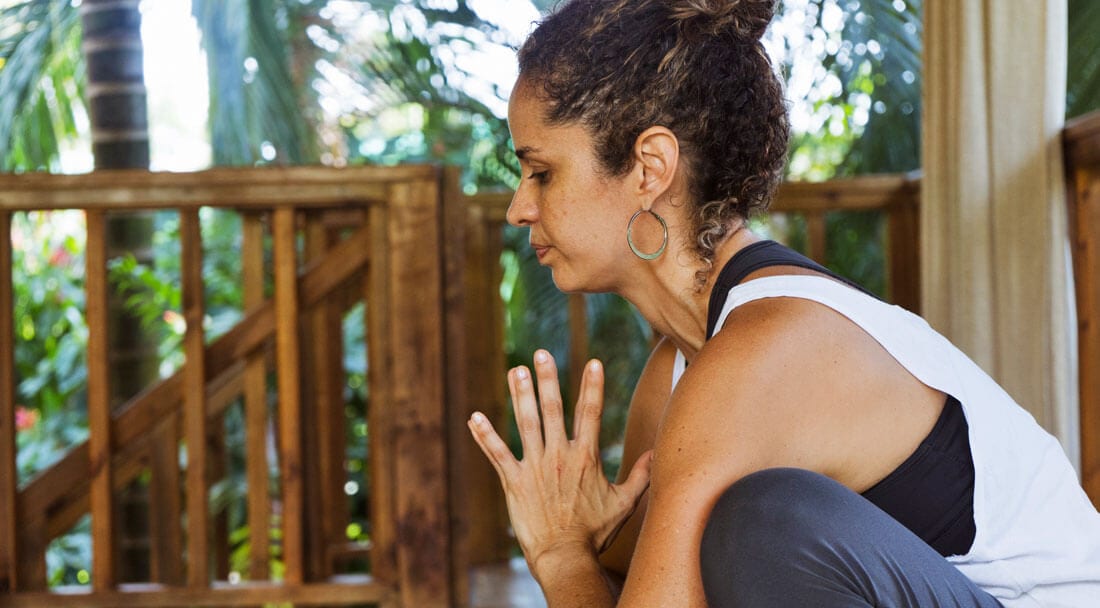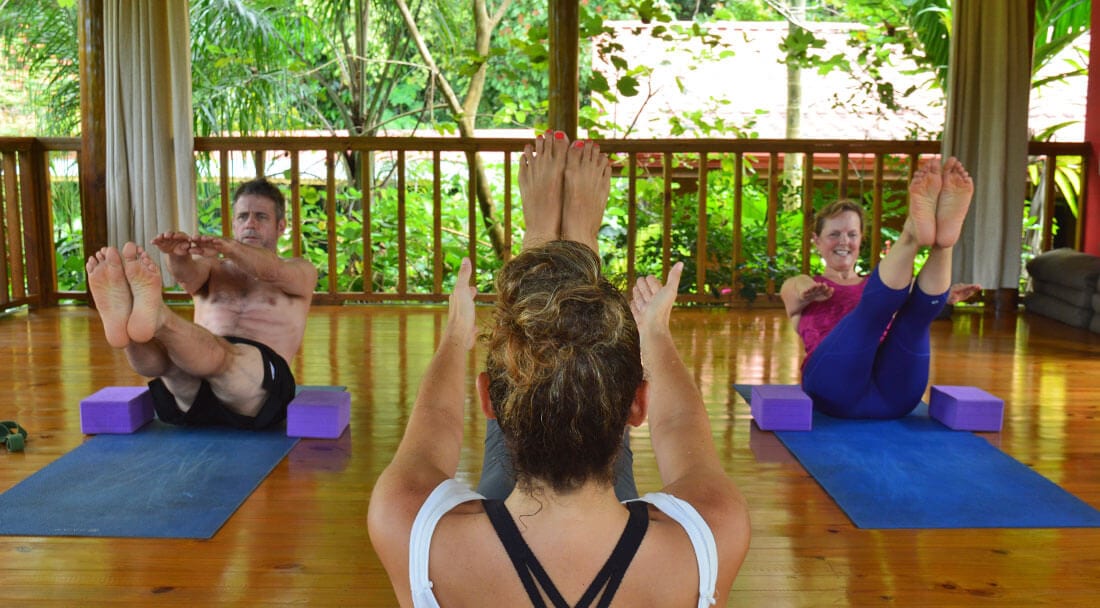Yoga came into my life for the first time in 1999, when I joined a class at a friend’s house. A few months later, I began attending the classes being offered at my gym, and although now I don’t consider gyms to be the best place to learn yoga (as I will explain more below), these baby steps were the foundation upon which my love of yoga would grow.
Turning point with yoga
My true “turning point” was in 2001, when I went to visit my best friend in Boulder, Colorado. I commented to her sister that I was practicing yoga, so she invited me to go take a class with her teacher, something that turned out to be one of the most amazing experiences of my life. I felt such a deep and profound feeling of admiration towards the teacher, Richard Freeman, who, while I didn’t realize it then, is one of the most exceptional teachers in the Ashtanga style. Needless to say, I was officially hooked, and it was true for me, just as that teacher says in the video below, that “yoga can ruin your life” (in a good way of course)!
My turning point with yoga
 The fruits of Yoga were at this point so deeply carved on to my soul that no longer I could ignore “the calling”. I was hooked: I became a regular practitioner, and started reading a ton of yoga books, searching for information, and learning. More importantly, I kept practicing and practicing, traveling distances both near and far to study with other teachers. Eventually, I ended up in the hidden and remote South Coast of Crete, where I spent a summer working at a seasonal yoga retreat, an experience that shifted something inside me and changed my perception of life. It wasn’t just the practice, it was as though in that moment the Universe was perfectly aligned to provide me with everything that I needed: the bond I felt with my teachers, Radha & Pierre, the place, the people, the energy, and the connection with the earth. Most importantly, it was the first time in my life that I felt fully present and deeply connected.
The fruits of Yoga were at this point so deeply carved on to my soul that no longer I could ignore “the calling”. I was hooked: I became a regular practitioner, and started reading a ton of yoga books, searching for information, and learning. More importantly, I kept practicing and practicing, traveling distances both near and far to study with other teachers. Eventually, I ended up in the hidden and remote South Coast of Crete, where I spent a summer working at a seasonal yoga retreat, an experience that shifted something inside me and changed my perception of life. It wasn’t just the practice, it was as though in that moment the Universe was perfectly aligned to provide me with everything that I needed: the bond I felt with my teachers, Radha & Pierre, the place, the people, the energy, and the connection with the earth. Most importantly, it was the first time in my life that I felt fully present and deeply connected.
I teach yoga for the same reason I practice
Even through all those years, I never thought I would end up being a yoga instructor — all I wanted was to practice and go deeper. Yet I began to teach for the same reasons that I practice yoga myself: because I want to continue practicing and go deeper, but also to share with others my deep passion for this precious practice and help them to go deeper. Teaching for me is a transmission of energy. Therefore, it is my belief that the first thing we should do as teachers is to be committed to our own teachers and to our own practice. There is a very subtle energy, knowledge, and experience that can only be well understood and transmitted if you continue being a student, and if you have discipline and devotion towards the practice.

Correcting old mistakes
As mentioned before, I started practicing at a gym, surrounded by over 40 people, so I didn’t learn those important yogic principles of alignment and breath. For many years after, I practiced incorrectly, which led to several injuries. Finally, I found a really good teacher who essentially took me back to the beginning and showed me the right way to move through the poses and use the breath. That’s what I like to do with my students: to provide them a comfortable place to practice and take time, paying attention to their bodies and their breath, and carefully explain the details of alignment, breath, and attention, so they can develop a safe practice before they move to more advanced postures.
Teaching yoga from the beginning
Hatha Yoga, the style upon which I base my beginner classes, is known as “meditation in action”. It is excellent style for beginners because it allows you to carefully learn the asanas, alignment, drishtis (fixed gaze), bandhas (body locks), and breath. Before you move into a more advanced practice, it is especially important to understand the breath; breathing is the foundation of the practice, if we are not breathing properly, we are not practicing yoga and we lose the opportunity to experience the “juice” of the practice. By repetitive movement the memory of the body recognizes each detail and then at some point you naturally start flowing, and that’s when yoga really starts to happen.

Sharing the good!
I teach because I appreciate the potential of each student, and because it’s an opportunity for me to share something I deeply love and highly believe is a medicine for our bodies and our souls. And I because I want to provide my students the same opportunities that I was granted with when I spent a summer in Crete: to open up their hearts, quiet the noise in their heads, and release what needs to be released in order to be fully present, fully alive, to be able to appreciate every moment for what it is — a miracle of life.
Get a Toolkit to Create Calm in Your Inbox
Watch the first lesson from our full immersive course: 8 Limbs of Ashtanga Yoga, FREE!
Change the heading on the Separator tab ->
Search
Get a Toolkit to Create Calm in Your Inbox
Watch the first lesson from our full immersive course: 8 Limbs of Ashtanga Yoga, FREE!
Change the heading on the Separator tab ->
Most Read Blogs
What is the Meaning of Anjali Mudra?
May 27, 2020
Fitness for Surfers: Workouts, Exercises & Training
February 10, 2022
The Best Places to Eat in Uvita, Costa Rica
May 19, 2022
How to Get From SJO to Costa Ballena, Costa Rica
May 31, 2018
Change the heading on the Separator tab ->
Categories
Categories
- Bodysurfing (5)
- Food (6)
- Responsible Business (6)
- Surfing (59)
- Travel (62)
- Yoga (38)
Change the heading on the Separator tab ->
Newsletter
Thanks for subscribing! Please check your email for further instructions.
Change the heading on the Separator tab ->
Follow Us
Pilar
Change the heading on the Separator tab ->
Read more
Yin Yang Yoga
Words by Carly Stoenner
Yin-Yang yoga is a harmonious blend of two distinct yoga styles: the slow, meditative Yin practice and the more energetic, dynamic Yang sequences. This unique fusion mixes the best of both worlds,…
Yoga for Core Strength
Words by Carly Stoenner
A strong core is more than just a physical achievement; it’s a foundation for easier movement, improved posture, and even heightened confidence. Your core is a network of muscles that stabilizes and…
Beginner Yoga Arm Balances
Words by Carly Stoenner
Yoga arm balances require strength, balance, and mental focus. The foundation for these poses is developed throughout your entire yoga practice, with strength and stamina gradually built upon over time to achieve…



